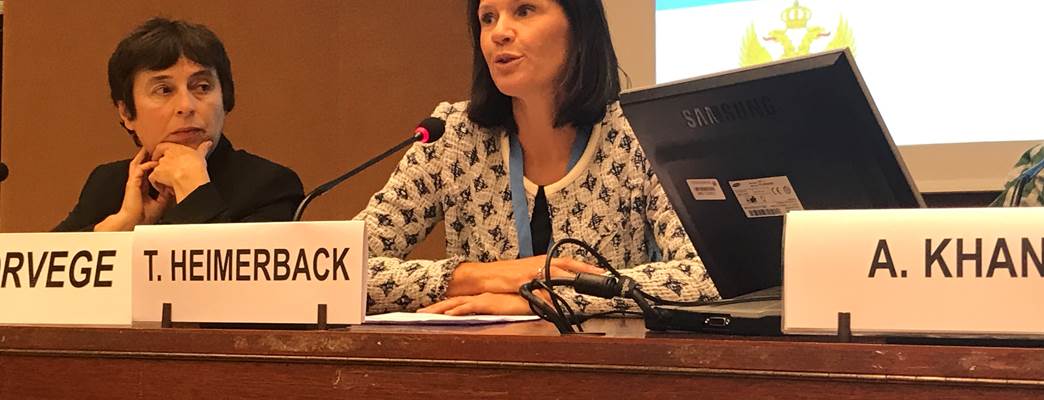Violence against children is a global phenomenon. Data shows that more than 50 per cent of boys and girls aged 2-14 (and in some countries, more than 70 per cent) are generally exposed to at least one form of severe physical and psychological punishment from family members. Many children still find it extremely difficult to speak to outsiders when violence occurs within the family, let alone to seek protection and redress.
To highlight the problem of violence against children in the region, UNICEF Regional Office for Europe and Central Asia, in collaboration Norway and Montenegro, organized a panel discussion in the margins of the Human Rights Council, on 26 September 2017.
Trine Heimerback, Minister and Deputy Permanent Representative of the Permanent Mission of Norway to the United Nations and Other International Organizations in Geneva, delivered the following remarks.
Check against delivery
Thank you for the opportunity to speak today. My appreciation in particular to UNICEF and Montenegro for taking the initiative to highlight an important and challenging topic. Thanks also to all the panelists who have agreed to share their perspectives.
Each day, children are beaten, assaulted and abused. Every five minutes a child dies because of violence. Last year, 1 billion children experienced physical, sexual, emotional or multiple types of violence globally.
Ending violence against children is a priority for the Norwegian government. In a national survey from 2015, 21 per cent of Norwegian youth reported to have experienced physical violence from at least one parent during childhood. Six per cent reported to have experienced severe forms of violence from at least one parent.
To stop these harmful practices we must be honest about the nature and the wide reaching effects. We must discuss the challenges, and have a clear plan of action to ensure that children and youth can live safely, free from physical and psychological violence.
It is always important to repeat that domestic violence and abuse is not a private matter. To appropriately address this problem, we must expand the authority of the child welfare services, clarify the responsibility of the health and care services, and ensure that health service personnel has competence and tools to detect maltreatment and abuse of children.
So what are we doing in Norway?
The UN Convention on the Rights of the Child is the basis for Norway’s policy concerning children. And the 2030 Agenda target (16.2) to end abuse, exploitation, trafficking and all forms of violence against and torture of children is also an important objective.
Norway published its national action plan to end violence against children in November 2014 and last year we developed an escalation plan to reach the goals set out in this plan.
The plan contains 88 measures. Let me highlight a few examples:
First, the best way to end violence against children is simply to prevent it. In Norway, the issue of violence and sexual abuse is included in professional study programs, such as health and social care studies and teacher trainings. We have also introduced routine questions about violence in connection with doctor visits and maternity check-ups. It is easier to build up a child than it is to repair an adult.
Second, to ensure that children have access to justice, Norway has established a nationwide network of Children’s Houses. The Children’s House is a service for children and youth exposed to violence and sexual abuse where judicial examination, medical examinations, treatment and follow-up can be carried out under the same roof.
Third, we need to involve the young people themselves. Norwegian health authorities are taking active steps to reflect the experiences of children and adolescents in the design of services.
Fourth, Norway recently launched a strategy based on a zero tolerance for bullying in schools and is currently implementing a range of measures as well as the legal framework to achieve this vision.
Our experience is that to fight violence and abuse against children cooperation, competence and a willingness to act are key requirements. We owe it to the children to step up and speak out. Let us raise children who won’t have to recover from their childhoods.
Thank you.
For more information on Norway’s work to end violence against children, go to: https://www.regjeringen.no/en/dokumenter/en-god-barndom-varer-livet-ut/id2344450/
